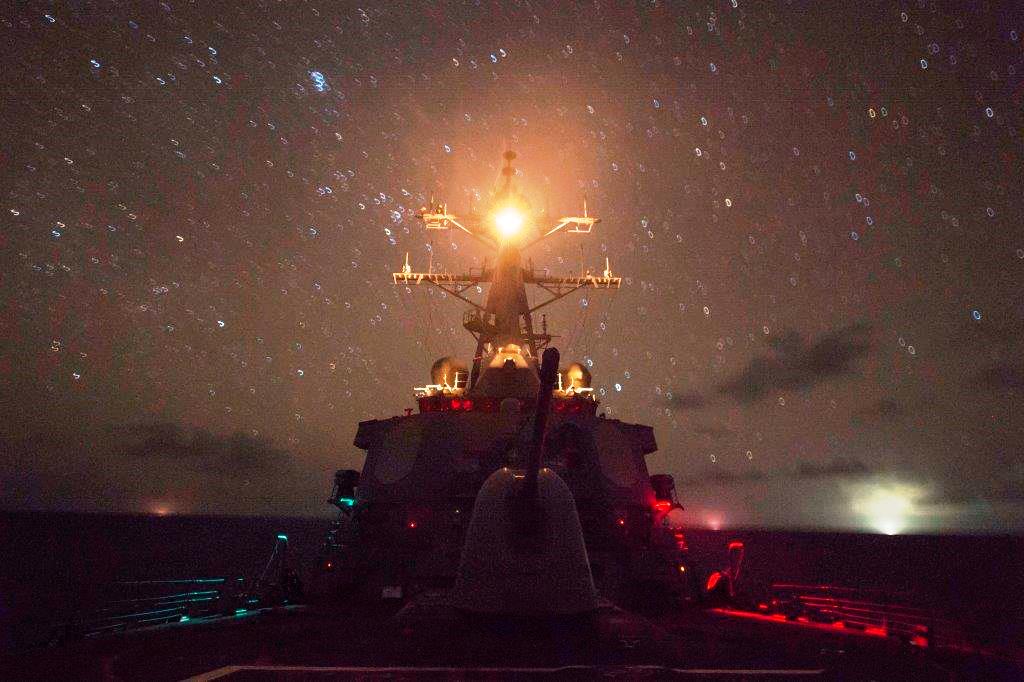Water Wars: Maritime Disputes Feature Prominently During Int’l Summit Circuit
By week’s end, the major players in the South and East China Sea will have participated in three separate international conferences touching on tensions in the Asian-Pacific. The meetings include the G-20 summit in Turkey, the Asia-Pacific Economic Cooperation (APEC) Forum in the Philippines, and the ASEAN Summit in Malaysia.

Published by The Lawfare Institute
in Cooperation With

By week’s end, the major players in the South and East China Sea will have participated in three separate international conferences touching on tensions in the Asian-Pacific. The meetings include the G-20 summit in Turkey, the Asia-Pacific Economic Cooperation (APEC) Forum in the Philippines, and the ASEAN Summit in Malaysia.
G-20 Summit in Istanbul (Nov. 15-16). Although the G-20 was expected to address maritime disputes, the Paris terrorist attacks dominated the non-economic segment of the Group’s agenda. Nonetheless, as promised, Japanese Prime Minister Shinzo Abe broached the subject of Chinese maritime aggression. While stressing that Sino-Japanese relations have seen “gradual improvement” of late, Mr. Abe cautioned that the PRC’s actions in the Asian Pacific remain a “concern” for the region. China’s official CCTV fired back, accusing the Japanese PM of engaging in “a disruptive stunt” and seeking to “spread discord” by “putting irrelevant topics into the agenda.”
APEC Leaders’ Meeting in Manila (Nov. 18-19). As if trying to make up for lost time at the G-20 Summit, the United States and China traded rhetorical barbs before the APEC Leaders’ Meeting even got underway. Apparently resigned to the fact that maritime disputes would be discussed at the summit despite China’s best efforts, PRC Vice Foreign Minister Liu Zhenmin attempted to cast his nation as the real victim in the region. Despite China’s “right and ability to recover the islands and reefs illegally occupied [in the South China Sea],” Mr. Liu argued, “We have maintained great restraint with the aim to preserve peace and stability.”
Hours later, U.S. President Barak Obama made his own symbolic statement, with a visit aboard a Philippine frigate, the BRP Gregorio del Pilar. According to both Reuters and the Washington Times, Mr. Obama’s mere presence aboard the ship—which the U.S. donated to the Philippines for patrolling the Spratlys—was enough to serve as “a direct challenge to Beijing’s claims to the South China Sea.” Yet President Obama went further. Citing America’s “iron-clad commitment to the defense of our ally the Philippines,” he announced that two more U.S. vessels will be transferred to the Philippines as part of a $250 million package to enhance regional maritime security.
Sparks continued to fly during the APEC summit itself. After meeting with Philippine President Benigno Aquino III, Mr. Obama called on China to stop all land reclamation and military activities in the South China Sea. President Obama also endorsed a process of arbitration for settling maritime disputes in the region and other “bold steps to lower tensions.” PRC Foreign Ministry spokesman Hong Lei defended the construction work as “lawful, justified and reasonable,” adding that “[i]f there is something that should stop, it is the United States should stop playing up the South China Sea issue . . . .” Although China hoped to avoid such verbal sparring, it could at least claim one victory in Manila: the APEC Joint Ministerial Statement made no reference to the South China Sea or maritime disputes.
ASEAN Summit in Kuala Lumpur (Nov. 21-22). Despite its success in Manila, the PRC may have a harder time keeping maritime disputes off ASEAN’s agenda. Based on an advanced draft, The Manichi Shimbun reports that the opening declaration, which will be made by Malaysian Prime Minister Datuk Seri Najib Razak, speaks of the importance of freedom of navigation and aviation, condemns land reclamation in the South China Sea, and calls on all nations to abide by UNCLOS. Further, the Obama Administration’s main Asia policy advisor confirmed that Mr. Obama and other regional leaders will raise the South China Sea dispute at the Summit.
In other news…
United States
Over the past week, additional details have emerged on the U.S. overflight operation in the Spratlys last Thursday. Despite its previous report to the contrary, The Hill suggested that the two American B-52 bombers did not make a pass within twelve nautical miles of any PRC-held artificial islands, citing an interview with General Lori Robinson (USAF). General Robinson also recapped the conversation between China’s air traffic control and a U.S. pilot during the overflight, which she described as routine. The Diplomat’s Ankit Panda provides additional analysis of the exchange, explaining that the incident was consistent with past Chinese behavior.
On Monday, the destroyer USS Stethem arrived at Wusong Military Port in Shanghai for a week-long visit that will include a joint training exercise with PLA naval ships on signaling communication and the Code of Conduct on Unplanned Encounters at Sea. The visit not only marked the first port call since the United States conducted a freedom of navigation (FON) patrol in the Spratlys, but it also served as the first time a U.S. vessel has berthed at a Chinese military facility.
Coinciding with the Stethem’s visit, Admiral Scott Swift flew to Shanghai on Monday for his first trip to China as Pacific Fleet Commander. After meeting with his counterpart, Vice Admiral Su Zhiquan, Admiral Swift said that the two had agreed on their responsibility to ensure that “friction points on policy don’t become friction points at sea.” He also advocated for international mediation on maritime dispute in the Asian Pacific as the best way to avoid “force and coercion.”
Japan
The Japanese Ministry of Defense reported that a PLA Navy intelligence ship engaged in information gathering near the Senkaku-Diaoyu Islands last Thursday, although according to The Asahi Shimbun, the Chinese ship did not enter the zone that Japan claims as territorial waters. In response, Japan’s Navy plans to increase patrols near the disputed islands.
Also, Mr. Abe plans to meet with Mr. Obama in advance of this weekend’s ASEAN Summit to discuss his plans to stress the need for rule of law in the Asian Pacific at the East Asia gathering. Ahead of the meeting, Japanese Chief Cabinet Secretary Yoshihide Suga told reporters that Japan had no particular plans to take part in U.S. FONOPS but that it would be willing to conduct joint naval drills with the United States.
Philippines
Manila took advantage of its role as host of the APEC Summit to conduct some bilateral diplomacy, which culminated in several agreements with potential ramifications for the South China Sea. First, President Aquino and Vietnamese President Truong Tan Sang signed a strategic partnership agreement that includes economic, defense, and maritime components. Second, on Thursday, Mr. Aquino and Japanese PM Abe broadly agreed on a pact for the transfer of military hardware and technology. This marks the first time Japan has agreed to directly donate military equipment to another country. Lastly, as noted above, the United States has also pledged two ships and funding to help the Philippines bolster its maritime security capabilities. During the announcement ceremonies for all three agreements, Chinese maritime aggression was cited as a contributing factor, if not the main rationale, for the accords.
Australia
Australian Prime Minister Malcolm Turnbull also used this week’s summitry to engage in some diplomacy. On Saturday, before the G-20 meetings in Turkey, Mr. Turnbull met with his Japanese counterpart, Mr. Abe, for the first time since taking over as PM. Among other things, the two agreed that the PRC’s actions in the South and East China Seas are “a big source of regional concern.” Several days later, the Australian leader also visited with President Obama in Manila. After the meeting, Mr. Turnbull declared that Australia and America were “of the same mind” regarding the importance of rule of law in the Asian Pacific, but according to The Guardian, he remained coy about the possibility of joining in U.S. FONOPS.
Malaysia
Last Saturday, Malaysia’s Deputy Prime Minister, Ahmad Zahid Hamidi, lambasted a “regional superpower” for violating its 200 nautical mile exclusive economic zone by constructing airstrips and other facilities on three atolls off the coast of Sabah and harassing fishermen. Any question that Mr. Zahid was referring to China was dispelled when he added, “To claim this part of the South China Sea as theirs due to historical narrative is invalid.” Further, Mr. Zahid advocated resorting to the use of force if necessary: “If our country is threatened or being encroached, we Malaysians should rise to defend our country.”
As The Diplomat’s Shannon Tiezzi explains, this not-so-thinly-veiled critique of China “is the exception rather than the rule” for Kuala Lumpur. Elsewhere at The Diplomat, Prashanth Parameswaran looks to Malaysian domestic politics as the explanation for this hawkish shift. Despite the rhetoric, however, Mr. Parameswaran suggests that Malaysian Prime Minister Najib’s administration still hopes to preserve the “special relationship” with Beijing. While also citing domestic politics as the force behind Kuala Lumpur’s “end to its softy-softy approach,” the Asia Sentinel paints a less optimistic picture of the future. What is certain is that Beijing considers this week’s summitry as an opportunity to reboot the bilateral relationship, so the future of Sino-Malaysian relations will be clearer by the conclusion of the ASEAN Summit.
Analysis, Commentary, and Additional Information
On Wednesday, the U.S.-China Economic Security and Review Commission released its annual report to Congress, which covers bilateral security dynamics, trade, and economic relations, in addition to investigating China’s evolving relationships with other countries. Of particular interest, the 2015 Report discusses freedom of navigation, island reclamation, and other issues that directly impact the maritime disputes in the South and East China Seas.
Over at Foreign Policy, James Holmes explains “How Washington Can Get Back on Course in the South China Sea,” and Richard Miles assesses the relative naval capabilities of the PRC and the U.S. The National Interest’s Michael Mazza looks at what it would mean for the United States to “become a resident power in the South China Sea” with bases in the Philippines. And elsewhere on Lawfare, Pete Pedrozo and James Kraska dive into the finer points of UNCLOS to argue that the two U.S. FONOPS are “models in how to squander flawless operational execution with confused, inconsistent, and ultimately damaging messaging . . . .”
Please note that, after this week, Water Wars will be taking a break for exams and that reporting will be light or nonexistent through the holidays.




